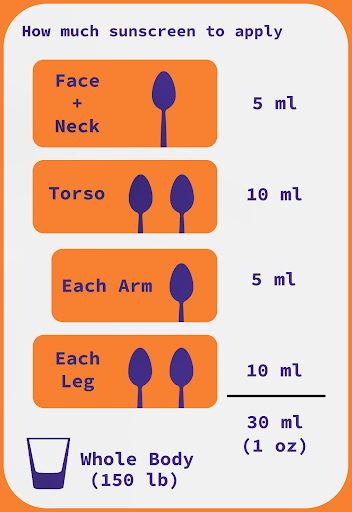Chemical sunscreens have no proven health risks, but they ARE proven to protect the skin from the sun’s UV radiation — a major risk factor for skin cancer. As with many things in our daily lives, we can’t be sure that chemical sunscreens are 100% risk-free. Still, medical and scientific experts agree that the benefits of chemical sunscreens outweigh the potential risks. To be extra cautious, experts recommend using physical sunscreens instead of chemical sunscreens during childhood or pregnancy if possible.
Chemical sunscreens have environmental risks, most notably to ocean life. Here, we’ll be focusing on personal health concerns from sunscreen use.
Read on to learn more about the risks and benefits of chemical sunscreens so you can decide what’s best for you.
➡️ What are chemical sunscreens?
Chemical sunscreens contain organic chemicals that act as ultraviolet (UV) filters. To find out which type of sunscreen you have, look at the Drug Facts label on the back of your bottle. There are only two types of mineral sunscreens — zinc oxide and titanium dioxide. Any other active sunscreen ingredient is a type of chemical sunscreen.
The following commonly used chemical sunscreen ingredients are FDA-approved: avobenzone, homosalate, octocrylene, octinoxate, octisalate, oxybenzone, and ensulizole. Each of these is also approved for sunscreen use in the European Union.
➡️ What are the benefits of chemical sunscreens?
Sunscreen protects your skin from ultraviolet (UV) damage by filtering out the sun’s harmful rays. You may be able to see sun damage happen if your skin changes color from sun exposure. But sun damage isn’t always noticeable. And sun damage doesn’t go away when a tan fades away. Instead, sun damage accumulates, increasing your chances of developing skin cancer over time with each new exposure.
If you’ve ever missed a spot of sunscreen and noticed later when your skin changed color there, you know it works. Sunscreen is proven to prevent sun damage to skin. However, there is little direct evidence that sunscreen (or other sun-protective measures) prevents skin cancer. In addition, more research is needed in diverse populations. Most of the evidence we have in favor of sunscreens preventing skin cancer comes from studies done in Australia and Norway — populations with a higher risk of skin cancer.
The lack of solid evidence isn’t surprising, though. Precisely tracking people’s daily sun exposure and use of sun protection from early childhood well into adulthood (when most skin cancers occur) wouldn’t be feasible. Likewise, randomized trials of sunscreen use could be unethical (imagine the sunburns for the placebo group!) and also not capture long term-effects. Plus, sun exposure is only one cause of skin cancer, and not everyone has the same risk level.
While definitive evidence is hard to get, there’s a lot of indirect evidence that using UV protection is important. UV exposure is considered the primary cause of most skin cancers (including melanoma, basal cell carcinomas, and squamous cell carcinomas). UV radiation from the sun (or tanning beds) is a known carcinogen. Unprotected sun exposure causes DNA changes known as mutations. The more mutations, the higher the chances that a damaged cell will grow out of control and become cancerous.
To help prevent skin cancer, dermatology and cancer experts recommend using sunscreen (chemical or mineral) along with other sun-safe habits. As a bonus, sunscreens may also help minimize other visible skin changes from sun damage.
With so many myths floating around TikTok, let’s clear up any confusion with some basic facts.
FACT: Broad-spectrum chemical (or mineral) sunscreens with a sun protection factor (SPF) of 15 or higher protect your skin from sun-damage [archived link] , which may lower your risk of skin cancer. To get this benefit, follow the directions on your sunscreen product and use sunscreen along with other sun protective measures.
FACTS about skin cancer risk:
✅ No suntan is “healthy” — tanning is the result of DNA damage.
✅ People with darker skin have a lower risk of skin cancer but still need sun protection.
✅ People with lighter or sun-sensitive skin have a higher risk of skin cancer.
✅ Genetics, lifestyle factors, some medications, and certain medical conditions or histories can increase anyone’s risk of skin cancer, regardless of skin color.
➡️ What risks do chemical sunscreens have?
Recent research found that chemical sunscreens get absorbed into the bloodstream [archived link] and may stay there for weeks. It’s not unusual for personal care products to be absorbed into the body, and this doesn’t automatically mean a product is unsafe to use. So far, there’s no clear evidence showing that using chemical sunscreens can cause health problems in humans.
What does the FDA say?
✅ The FDA doesn’t say that chemical sunscreens are “unsafe.”
✅ The FDA says it’s OK to use chemical sunscreens since they provide a clear health benefit. ✅ The FDA is asking chemical sunscreen manufacturers to provide more safety data in order to determine whether the active ingredients can be classified as generally recognized as safe and effective (GRASE). This process is expensive for sunscreen manufacturers and requires testing to be done on animals.
To help speed up the FDA approval process of sunscreens, bipartisan legislation was introduced in early 2024 that would remove the animal testing requirement. Critics of the FDA’s current process hope this change will lead to better sunscreen options for American consumers.
Unproven (but possible) health risks
Some research in animals suggests chemical sunscreens (at high doses) could cause changes in thyroid or sex hormones. However, recent toxicology studies (also in animals) haven’t confirmed this to be true. Studies in humans have also been inconclusive. Based on what we know, it’s still considered possible that chemical sunscreens could cause mild hormonal effects in humans.
➡️ Special concerns: childhood and pregnancy
Mineral sunscreens are better options during pregnancy and for children 6 months and older since they aren’t absorbed and are generally regarded as safe and effective (GRASE).
The American Academy of Pediatrics (AAP) and the American College of Obstetrics and Gynecology recommend avoiding oxybenzone during pregnancy and childhood. It hasn’t been proven to change pregnancy outcomes or affect child growth and development, but risks haven’t been ruled out. In addition, young children might take longer to break down chemical sunscreens like oxybenzone, which may cause them to build up in their bodies.
➡️ Should I stay away from chemical sunscreens?
It’s up to you. For most people, the benefits of chemical sunscreens outweigh the potential risks, and experts say to use whichever type of sunscreen you prefer or have available. Even for children, the AAP says using chemical sunscreens to prevent sunburn is better than using no sunscreen at all.
Talk with your or your child’s clinician about which type of sunscreen is best for you. They can also help you understand your individual needs for sun protection.
➡️ What is the sunscreen paradox?
Have you heard of the “sunscreen paradox”? If sunscreen makes you feel protected, it may give you a false sense of security and lead to more sun exposure. There is some truth to this — if we put on a small amount of sunscreen and forget to reapply, we may indeed end up getting a sunburn if we overestimate how well our sunblock works.
Sunscreen only protects us if it’s applied liberally and often, and even then, it’s not perfect. Sunscreen needs to be used with other sun-safe measures, like wearing a hat and long sleeves, especially during peak sun hours.
➡️ A word on benzene: In 2021, the FDA recalled some sunscreen products after a company called Valisure found high levels of benzene (a cancer-causing chemical found in everyday air pollution). Sunscreen sprays, in particular, were prone to benzene contamination. So this might be a reason to avoid using sunscreen sprays, which are unsafe when accidentally inhaled even if no benzene is present. You can check for sunscreen recalls here: FDA Drug Recalls.
Stay sunny, stay sun-safe,
Those Nerdy Girls
For more info, check out these TNG recent posts on sunscreen:
What are the 3 most important sun-safe habits for your skin?
Are mineral sunscreens *really* better than chemical ones?
Other recommended reading:
Sunscreen: How to Help Protect Your Skin from the Sun
Sun Safety: Information for Parents About Sunburn & Sunscreen
An Update on Sunscreen Requirements: The Deemed Final Order and the Proposed Order
How Do I Protect Myself from Ultraviolet (UV) Rays?
Link to Original Substack Post



